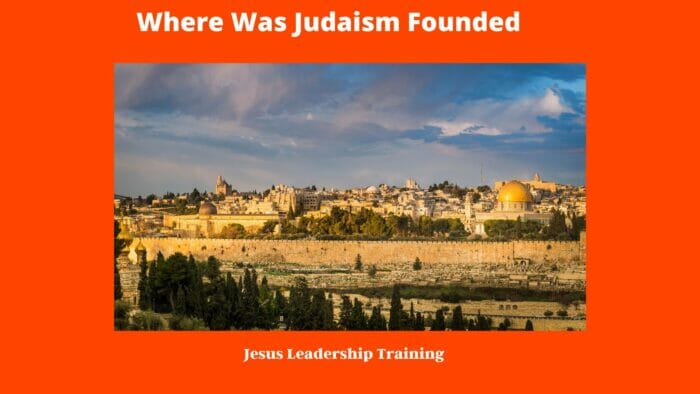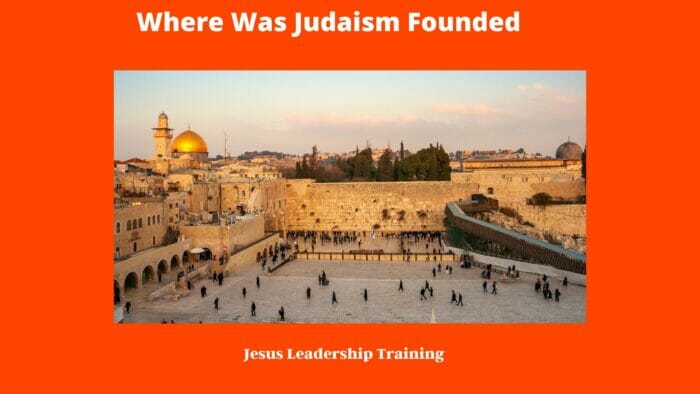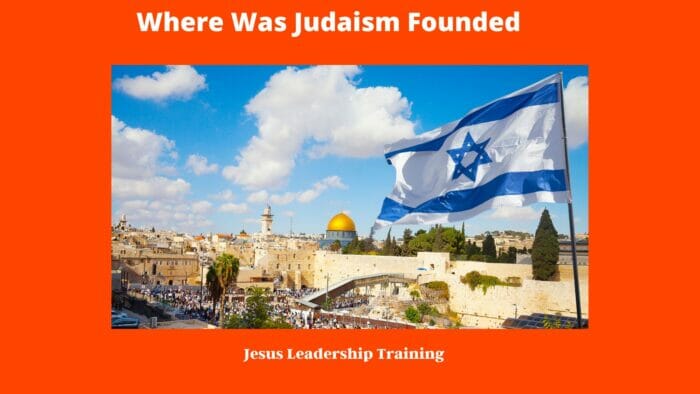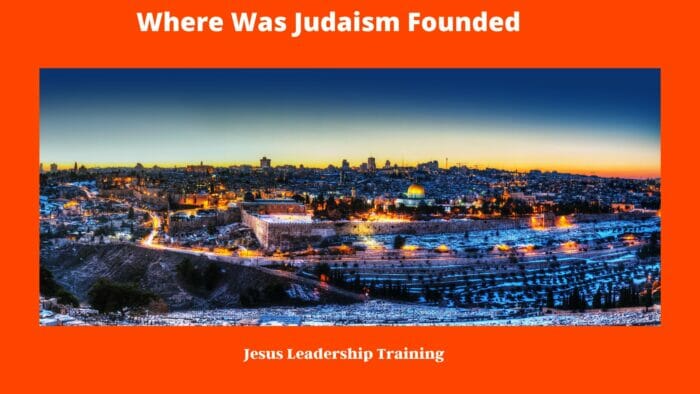Where Was Judaism Founded – Judaism, one of the world’s oldest religions, has a rich and intricate history that spans thousands of years. As we explore the question, “Where was Judaism founded?” we embark on a journey to uncover the origins and geographical roots of this influential faith. Join us as we delve into the historical landscape, tracing the footsteps of the Jewish people and unraveling the complex tapestry of their beginnings.
Table of Contents
Where Was Judaism Founded?
The question of where Judaism was founded encompasses a multifaceted exploration of both geographical and historical factors. To understand the origins of Judaism, we must examine the ancient land of Canaan and the emergence of the Israelites.
The Land of Canaan: A Crucible of Civilization
The story of Judaism begins in the ancient land of Canaan, which encompassed present-day Israel, Palestine, Lebanon, and parts of Jordan and Syria. Canaan was a fertile region situated in the eastern Mediterranean, renowned for its strategic location and rich resources. This land would serve as the backdrop for the birth of Judaism.
The Israelites: A Chosen People
Within the larger tapestry of Canaan, the Israelites emerged as a distinctive group, playing a pivotal role in the foundation of Judaism. According to religious texts and historical accounts, the Israelites believed in a covenant between themselves and a singular, transcendent deity, whom they referred to as Yahweh.

Here is a timeline of key events in the history of the Israelites, who are considered God’s chosen people in the Bible:
c. 2000-1500 BCE: Patriarchs
- Abraham, Isaac, and Jacob, known as the patriarchs, establish the foundation of the Israelite nation.
- God’s covenant with Abraham promises land and descendants.
c. 1446 BCE: Exodus
- Moses leads the Israelites out of slavery in Egypt after the ten plagues.
- The giving of the Ten Commandments at Mount Sinai.
c. 1406-1386 BCE: Wilderness Wanderings
- The Israelites wander in the desert for 40 years as a result of disobedience.
- God provides manna and water during their journey.
c. 1406-1050 BCE: Conquest of Canaan
- Joshua leads the Israelites in the conquest of Canaan, the Promised Land.
- The land is divided among the twelve tribes of Israel.
c. 1050-931 BCE: United Monarchy
- Saul, David, and Solomon rule as the first three kings of Israel.
- Solomon builds the First Temple in Jerusalem.
c. 931 BCE: Divided Kingdom
- The kingdom splits into the northern kingdom of Israel and the southern kingdom of Judah.
- The division is due to political and religious differences.
c. 722 BCE: Assyrian Exile
- The northern kingdom of Israel is conquered by the Assyrians, leading to the ten northern tribes’ dispersion.
c. 586 BCE: Babylonian Exile
- The southern kingdom of Judah is captured by the Babylonians, and Jerusalem is destroyed.
- The Babylonian Exile begins, lasting for 70 years.
c. 538 BCE: Return from Exile
- The Persian king Cyrus the Great allows the Jews to return to Jerusalem.
- The Second Temple is built.
c. 516-5 BCE: Second Temple Period
- The Israelites rebuild their nation and the Second Temple.
- Various empires, including the Persian, Hellenistic, and Roman, exert control over the region.
c. 4 BCE – 30 CE: Life of Jesus
- Jesus, a Jew, emerges as a central figure in Christianity, drawing from Jewish traditions.
c. 70 CE: Destruction of Second Temple
- The Second Temple in Jerusalem is destroyed by the Romans.
- The Jewish diaspora intensifies as Jews are dispersed throughout the Roman Empire.
c. 1948 CE: Modern Israel
- The State of Israel is established, providing a homeland for Jews after centuries of dispersion.
This timeline outlines key events in the history of the Israelites, who are central to both biblical and world history. Their story encompasses periods of triumph, exile, and the enduring legacy of monotheism that has influenced the Abrahamic religions of Judaism, Christianity, and Islam.

Ancient Israel: The Promised Land
As the Israelites wandered through the wilderness for generations, their quest for a homeland culminated in the land promised to them by Yahweh—Israel. This region, encompassing modern-day Israel and Palestine, holds immense religious and historical significance for the Jewish people.
The Historical Significance of Israel
Understanding the historical context surrounding the birth of Judaism requires delving into the complexities of Israel’s past. The following subheadings shed light on pivotal events and periods in the region’s history.
here’s a table explaining the historical significance of Israel to the world:
| Period | Historical Significance |
|---|---|
| Ancient History (Biblical Times) | |
| c. 2000-1500 BCE | Birthplace of monotheistic religion – The Abrahamic covenant laid the foundation for Judaism, Christianity, and Islam. |
| c. 1406-1050 BCE | Exodus and Conquest of Canaan – The biblical narratives of the Exodus and conquest of Canaan are central to Jewish identity and heritage. |
| c. 1050-931 BCE | United Monarchy – The reigns of Saul, David, and Solomon established the first centralized Israelite state. |
| 587-538 BCE | Babylonian Exile and Return – The Babylonian Exile marked a pivotal moment in Jewish history, influencing their religious beliefs and practices. |
| Second Temple Period | |
| c. 516-5 BCE | Second Temple – The Second Temple in Jerusalem was a focal point for Jewish worship and identity during this period. |
| Hellenistic and Roman Rule | |
| c. 332-63 BCE | Hellenistic Influence – The conquest of Alexander the Great introduced Greek culture to the region, impacting language and philosophy. |
| c. 63 BCE – 324 CE | Roman Rule – The Roman occupation led to the destruction of the Second Temple and further Jewish diaspora. |
| 1st Century CE | Life of Jesus – The life and teachings of Jesus Christ, a Jew from the region, profoundly influenced Christianity. |
| Medieval and Ottoman Rule | |
| Middle Ages | Center of Scholarship – Jewish scholars in the region made significant contributions to science, philosophy, and theology. |
| 1517-1917 | Ottoman Empire – The region was part of the Ottoman Empire, impacting its cultural and religious diversity. |
| Modern Era | |
| c. 20th Century | State of Israel – The establishment of Israel in 1948 marked the return of Jews to their ancestral homeland after centuries of dispersion. |
| Ongoing Conflict | Israeli-Palestinian Conflict – The ongoing conflict in the region has geopolitical significance and implications for global politics. |
| Cultural and Religious Impact | |
| Abrahamic Religions | Birthplace – Israel is central to the history and beliefs of Judaism, Christianity, and Islam, with Jerusalem as a holy city for all three. |
| Archaeological Discoveries | The region has yielded numerous archaeological finds, shedding light on ancient civilizations and biblical history. |

Israel’s historical significance extends far beyond its geographical size. Its role in the development of monotheism, the impact of its ancient history, and its status as a sacred land for multiple religions make it a place of profound importance on the world stage. Additionally, its modern history, including the establishment of the State of Israel and ongoing conflicts, has global implications for diplomacy and peace efforts.
Ancient Israelite Kingdoms: United and Divided
The establishment of the ancient Israelite kingdoms marks a significant milestone in the historical narrative of Judaism. From the United Monarchy, under King David and King Solomon, to the subsequent division into the Kingdoms of Israel and Judah, this era witnessed the consolidation and fragmentation of Israelite power.
Babylonian Exile: A Period of Turmoil
During the 6th century BCE, the Babylonian Empire conquered the Kingdom of Judah, leading to the exile of many Jewish people. This period of turmoil, known as the Babylonian Exile, fundamentally impacted the religious and cultural development of Judaism.
The Second Temple Period: Restoration and Revolt
Following the Babylonian Exile, the Jewish people returned to their ancestral homeland and rebuilt the Second Temple in Jerusalem. This era witnessed the rise of various Jewish sects, such as the Pharisees, Sadducees, and Essenes. It also bore witness to significant revolts against foreign powers, most notably the Maccabean Revolt.

Roman Rule and the Destruction of the Second Temple
Under Roman rule, tensions between the Jewish population and imperial authorities reached a boiling point. In 70 CE, the Romans destroyed the Second Temple, an event that profoundly impacted Jewish identity and worship. The Jewish diaspora, the scattering of Jewish communities across the world, gained momentum during this time.
here’s a table outlining the events leading to the destruction of the Second Temple (Herod’s Temple) in Jerusalem, including the aftermath:
| Event | Date | Description | Aftermath |
|---|---|---|---|
| Building of Herod’s Temple | 19 BCE – 64 CE | King Herod the Great undertakes an extensive renovation and expansion of the Second Temple, transforming it into a magnificent structure. | The renovated temple becomes a center of Jewish worship and identity. |
| Prophetic Signs and Unrest | 30-66 CE | Various prophetic signs, social unrest, and tensions between Jewish factions contribute to a volatile atmosphere in Jerusalem. | The Jewish population is divided along religious and political lines, weakening the city’s stability. |
| Roman Occupation and Taxes | 63 BCE – 66 CE | Roman rule in Judea becomes increasingly oppressive, leading to taxation, conscription, and cultural clashes with the Jewish population. | Growing resentment and resistance against Roman rule. |
| Zealot Uprising and Massacres | 66 CE | Jewish Zealots revolt against Roman authority, gaining control of Jerusalem. Massacres occur in the city, further escalating tensions. | The Zealot uprising strengthens Roman resolve to quash the rebellion. |
| Roman Siege of Jerusalem | 70 CE | Roman forces, led by Titus, lay siege to Jerusalem, resulting in famine and suffering within the city. | Destruction of the city and the Second Temple by Roman forces in 70 CE. |
| Destruction of the Second Temple | 70 CE | The Second Temple is set ablaze and razed to the ground by Roman soldiers, marking a significant tragedy in Jewish history. | The Jewish diaspora intensifies as Jews are dispersed throughout the Roman Empire. |
| Aftermath and Jewish Diaspora | 70-135 CE | The Jewish population mourns the destruction of the Temple and the loss of Jerusalem. Jewish religious practices shift towards synagogues and the study of the Torah. | The Bar Kokhba Revolt (132-136 CE) leads to further Roman suppression and the renaming of Judea as “Palestine.” |
| Legacy and Ongoing Jewish Identity | Over the Centuries | The loss of the Second Temple and Jerusalem becomes a central theme in Jewish theology and liturgy. The Western Wall (Wailing Wall) remains a sacred site for Jewish prayer. | Jewish communities flourish and persevere in various parts of the world, contributing to global culture and society. |
The destruction of the Second Temple by the Romans in 70 CE was a pivotal event in Jewish history, shaping religious practices, beliefs, and the Jewish diaspora. It has left a lasting impact on Jewish identity and continues to be commemorated through religious observances and remembrance of the tragedy.
Frequently Asked Questions (FAQs)
1. Was Judaism founded in Canaan?
Yes, Canaan played a pivotal role in the foundation of Judaism. The Israelites emerged as a distinctive group within Canaan and became the bearers of this ancient faith.
2. Who were the ancient Israelites?
The ancient Israelites were a group of people who believed in a covenant with the deity Yahweh. They played a crucial role in the formation of Judaism.
3. Where is the promised land mentioned in Judaism?
The promised land, as mentioned in Judaism, refers to the land of Israel. It holds profound religious significance as the homeland promised to the Israelites by Yahweh.
4. How did the Babylonian Exile impact Judaism?
The Babylonian Exile, during which many Jewish people were forcibly taken to Babylon, led to a period of introspection and religious development. It influenced the evolution of Judaism’s religious practices and texts.
5. What is the significance of the destruction of the Second Temple?
The destruction of the Second Temple in Jerusalem by the Romans was a significant event in Jewish history. It marked the end of centralized worship and the beginning of the Jewish diaspora.
6. How did the Jewish diaspora shape Judaism?
The Jewish diaspora resulted in the dispersal of Jewish communities across the world. This led to the development of diverse cultural and religious practices, influencing the evolution of Judaism as a global religion.
Best Bible Encyclopedias and Dictionaries
Below is a table featuring some highly regarded Bible Encyclopedias and Dictionaries along with their publishers and websites where they can be found or purchased.
| Title | Publisher | Website |
|---|---|---|
| The International Standard Bible Encyclopedia | Eerdmans | Eerdmans |
| Zondervan’s Pictorial Bible Dictionary | Zondervan | Zondervan |
| Easton’s Bible Dictionary | Thomas Nelson | Thomas Nelson |
| Holman Illustrated Bible Dictionary | B&H Publishing Group | B&H Publishing Group |
| The New Unger’s Bible Dictionary | Moody Publishers | Moody Publishers |
| HarperCollins Bible Dictionary | HarperOne | HarperOne |
| Vine’s Complete Expository Dictionary of Old and New Testament Words | Thomas Nelson | Thomas Nelson |
You can generally find these resources on the publishers’ websites, as well as other online book retailers such as Amazon or Christianbook. It’s always good practice to confirm availability and review additional details on the specific websites or other reliable online bookstores.
Final Thoughts – Where Was Judaism Founded?
As we have explored the question, “Where was Judaism founded?” we have journeyed through the annals of time, tracing the origins and historical developments of this ancient faith. From the land of Canaan to the establishment of Israel, from ancient kingdoms to exile and revolts, Judaism’s roots intertwine with the complex tapestry of human civilization. Understanding the geographical and historical context of Judaism’s birth enhances our appreciation for its enduring influence and serves as a testament to the resilience of a faith that has shaped the lives of millions throughout millennia.





